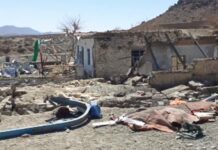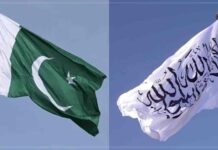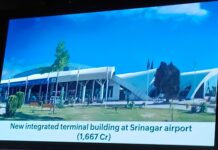New Delhi/United Nations, May 15: India on Wednesday expressed deep sadness over the death of ex-Indian Army officer Col Waibhav Anil Kale, who was killed when the UN vehicle he was travelling in was shelled in war-torn Rafah, even as the UN said that a fact-finding panel has been set up to investigate the incident.
The Ministry of External Affairs, in a statement, extended condolences to the family of Col Kale, and said that the Indian missions in the UN and in Israel are extending all assistance to repatriate the body to India.
Amid conflicting reports that the UN vehicle Col Kale was travelling in was hit by an Israeli IDF strike, the MEA also said that the Indian missions will be in touch with the relevant authorities regarding investigation into the incident.
Farhan Haq, Deputy Spokesman for the UN Secretary-General, said a fact-finding panel had been set up to investigate the incident in Rafah that led to the death of Col Waibhav Kale who was killed when “a weapon” fired from a tank impacted the rear of a white UN vehicle that he was travelling in.
The UN has also sent its condolences to Col Kale’s family, said Haq.
He also said that details of the incident are still being verified with the Israeli Defence Force.
After taking premature retirement from the Indian Army in 2022, Col Kale had joined the UN as a Security Coordination Officer in the United Nations Department of Safety and Security (DSS) two months ago.
He had earlier served with the 11 Jammu & Kashmir Rifles.
Col Kale is the first UN staffer to be killed in the ongoing Gaza war.
The other UN staff member working for DSS who was injured in the incident is a Jordanian woman, who is in ICU, said Farhan, declining to disclose her whereabouts. “She’s receiving medical attention. We believe that she will make it through,” he said.
Asked pointedly if the shots were fired from Israel, which has stationed its forces in Rafah, he did not give a direct answer, except to say that it was fired from a tank.
He reiterated that they are in talks with Israel to “determine exactly how this incident happened and the nature of what happened”.
Asked where the shots were fired from, he said: ”We believe it came from a tank in the area.”
Question: “Another follow-up to the incident in Gaza, you said you think that the shots were fired from the direction of a tank. Am I right that only the IDF have tanks in the region?
“Deputy Spokesman: I think that’s a safe assumption to make, yes. (cross-talk)”
Asked what were Col Kale and his DSS companion going to the European Hospital in Rafah for at the time, Farhan said it was part of their regular work of bringing people to different sites.
Asked about the composition of the panel, he declined to give a direct answer except to say that it is being set up by the UN’s Department of Safety and Security.
To a question on how many personnel from India are stationed in the region or are part of the DSS throughout the UN agencies, he said he did not have the numbers, but added that the UN has 71 international staff in Gaza.
“Obviously, we appreciate the contribution that India has made, and we also express our apologies and our condolences to the Government and people of India,” he added.
Asked if the UN views it as a “deliberate attack on the UN”, he said:
“The point I’m making is that this case is still under review. We’ll see what the review results in.”
Amid news reports that the IDF said that during operational activity in eastern Rafah on Saturday, “terrorists” were identified in UNRWA’s central logistics compound alongside UN vehicles, a media person asked whether the attackers could have been “mistaken” as the UN vehicles are clearly marked. To this, Farhan said: “It’s hard to say. Again, as the review proceeds, we’ll need to see what the precise nature of the circumstances were.”








